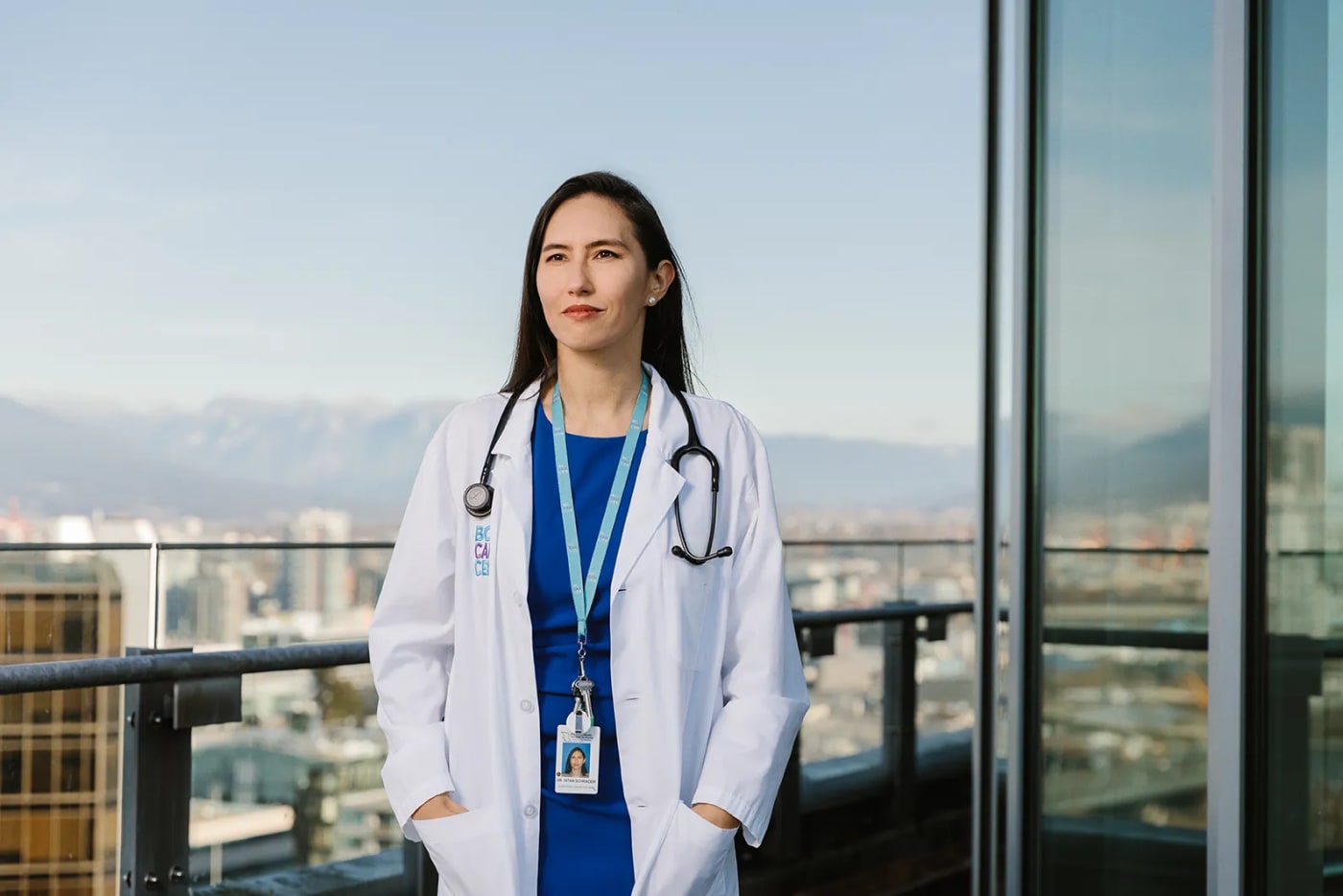
To support the Hereditary Cancer Program in B.C., contact Elissa Morrissette at 604.707.5992 or elissa.morrissette@bccancer.bc.ca
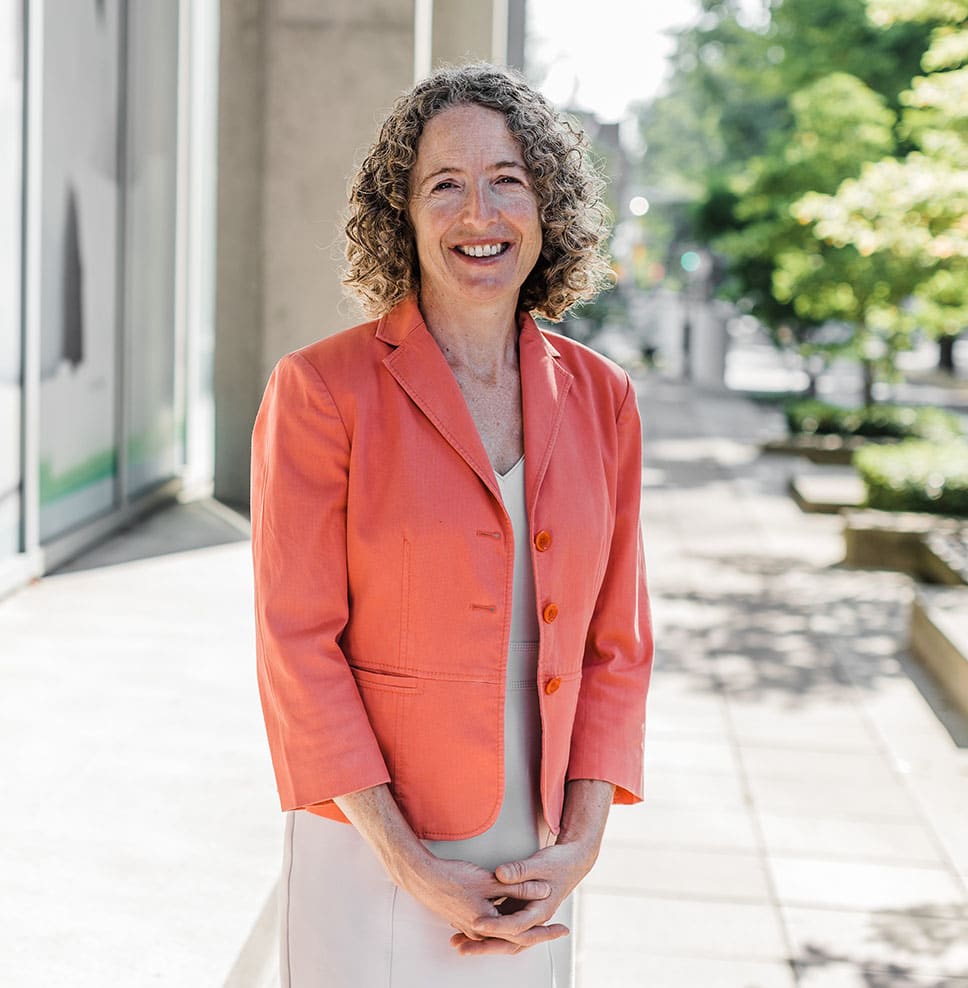
Connecting with our donors — all of you who generously give to support British Columbians facing cancer — is one of the most rewarding parts of my job. Recently, it was my pleasure to do just this at our annual Lunar New Year celebration and Palm Springs event.
What does ringing in the Year of the Rabbit over a traditional ten-course meal have in common with a gathering of snowbirds more than 2,500 km down the coast? Both are examples of the dedicated, diverse communities — made up of more than 80,000 donors from across the province — that believe, if we work together, we can make a difference.
Speaking of joining forces to improve cancer outcomes, one of our Beyond Belief priorities is accelerating access across the province, so on World Cancer Day we aligned with the global movement to close the care gap by supporting solutions that break down barriers to care right here at home.
This includes: A Patient Relief Fund providing financial aid to in-need patients, such as Dawson Creek’s Jocelyn Degula, to help cover travel, food and accommodation costs when receiving care. Injecting new life into BC Cancer – Kelowna’s systemic therapy suite to increase capacity in B.C.’s interior region. And, thanks to the Diamond Foundation’s incredible gift, identify, support and streamline care for thousands more women and their families at high risk for hereditary cancer.
Your support — big and small, through a fundraising event, an online donation, or over dumplings — will ensure world-class cancer care reaches us all, wherever in B.C. we call home.
Sincerely,
Sarah Roth
President & CEO
BC Cancer Foundation

From left: Lauri Glotman (née Diamond), Leslie, Gordon and Jill Diamond.
When BC Cancer approached Gordon Diamond more than 20 years ago about purchasing a $2 million parking garage he owned in Vancouver to home their new research centre he said, “No.”
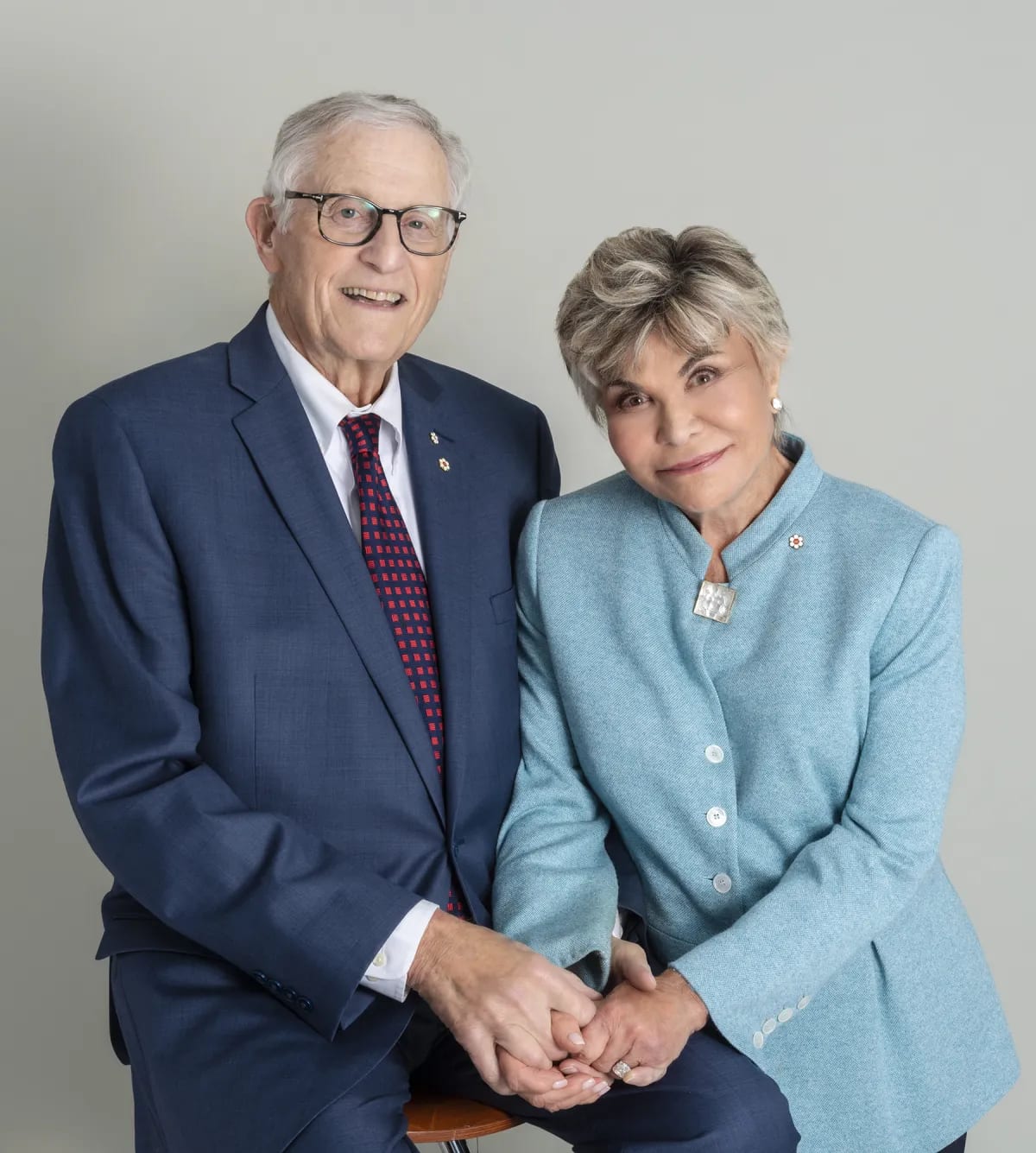
Gordon & Leslie Diamond
“My wife and my mother had breast cancer. I thought, ‘This could help others from going through what we did.’ They came to buy the land, and I gave it to them,” he says.
This was the beginning of a long history of support from the Diamonds (Gordon and his wife Leslie, and their daughters Jill and Lauri) that is culminating today in a gift of almost $7.2 million — one of the largest donations ever to the BC Cancer Foundation — to improve care for thousands of women and their families at high risk for hereditary cancer.
Currently, only 5% of the 50,000 British Columbians with an inherited gene (including BRCA1/2 mutations that put them at a much higher risk of developing breast, ovarian or prostate cancer) have been identified. This must change, says BC Cancer Foundation President & CEO Sarah Roth.
“Prevention and early diagnosis are crucial in stopping inherited disease. The more awareness and resources we can provide — through increased genetic testing and access to preventative screening — the more families we can save from the vicious cycle of having generation after generation face devastating cancer diagnoses.”
Dr. Kasmintan Schrader, co-director of BC Cancer’s Hereditary Cancer Program with Dr. Sophie Sun, says “The Diamond Foundation’s generous donation is a giant step on the path towards transforming hereditary cancer care across B.C. It will support three important clinical initiatives to accelerate identification of patients and significantly enhance our ability to provide follow-up support and care.”
“Not only will this provide the groundwork for future programs that will broaden our scope, it will also greatly increase our impact by reaching more families at higher risk of cancer,” says Dr. Sun.
Having sat on countless boards (including the BC Cancer Foundation’s), the Diamonds have been instrumental in establishing numerous programs, clinics and centres in B.C., many with a focus on women’s health. But this investment — to increase identification, break down barriers to screening and provide support for people at high risk for hereditary cancers — is even more personal.
“Hereditary cancer has impacted our family,” says Jill Diamond. “My grandmother unfortunately died of breast cancer. Had she known she had a BRCA gene mutation, and been screened properly, the cancer could have been caught earlier, and we would have enjoyed many more years with her.”
Women in B.C. have a 12% chance of developing breast cancer. In those who carry a BRCA gene mutation, the risk of diagnosis drastically increases to 70% by age 70. Similarly, ovarian cancer rates rise from under 2% in the general population to almost 50%. And men who carry a gene mutation are up to three times more at risk of developing prostate cancer.
The Diamond Foundation’s gift will fuel three life-saving clinical projects. The first will focus on reaching people of Ashkenazi Jewish descent, who are 10 times more likely (1 in 40) to carry a BRCA gene mutation. “We’re really proud to partner with BRCA in BC and BC Cancer on this,” says Jill, “because it fulfills one of our most important Jewish values, Tikkun Olam, which is the obligation to repair the world and make it a better place.”
A second will offer immediate genetic testing for breast cancer patients age 60 and under, upon biopsy, eliminating the need for a doctor’s referral — breaking down barriers to care in underrepresented groups such as Indigenous populations.
The third — and a first in Canada — is an outreach program that will directly contact relatives of individuals identified as high risk, increasing genetic testing rates and taking the burden off overwhelmed patients.
“We want to ensure that thousands more women and their families are not only identified as having a higher risk of cancer, but are also provided with the necessary additional life-saving screening,” says Jill. For breast cancer in particular, this includes annual MRIs and mammograms starting as early as age 25.
Three Breast Imaging Fellowships at BC Cancer – Vancouver, funded by the Diamond Foundation’s donation, will increase capacity and expertise for specialized breast radiologists. “This is an incredible investment in the future of breast imaging in B.C. and beyond,” says Fellowship Director Dr. Tetyana Martin, who will be mentoring the trainees in a full circle moment, having joined BC Cancer herself as a fellow in 2014.
“Women in B.C., particularly women at high risk for breast cancer, deserve timely access and world-class expertise when undergoing screening and diagnostic work up, and that can be achieved through fellowship opportunities such as these.”
Learning you have a higher risk of cancer, and a 50% chance of passing it on to your children, comes with a lot of questions, worry and fear. To help alleviate this, the Diamond Foundation’s gift is creating specialized positions including two nurse navigators, two nurse practitioners, three genetic counsellors, and additional resources for the BC Cancer Hereditary Cancer Program High Risk Clinic and the Hereditary Gynecologic Cancer Prevention and Support Clinic.
“This added support will give people the chance to breathe, understand that they have choices, and give them the knowledge to make the right decision for themselves and their families,” says Jill.
To streamline the patient experience further, the donation will also support a new space in Vancouver to provide all hereditary cancer clinical resources in one convenient location. Equipped with exam rooms, private counselling offices and a collaborative meeting space, it will offer patient-centred care in-person and virtually.

Thanks to genetic testing Shiraz Italia caught her ovarian cancer early.
Shiraz Italia knows firsthand how transformative this investment will be for families with a high risk of hereditary cancer. She lost her own mom to ovarian cancer when she was 12. In her late 30s, with two young kids of her own, she decided to undergo genetic testing — and ended up on, what at the time was a 12 to 18-month wait list.
“Something, my gut instinct, told me not to wait,” says Shiraz. She paid to be tested privately, and the results came back positive for a BRCA1 mutation. At her doctor’s recommendation she underwent surgery to remove her ovaries and fallopian tubes, where most ovarian cancers originate.
Ten days later she received a phone call that they had found a small tumour. After a hysterectomy and six rounds of chemotherapy, Shiraz says finding out she had an inherited cancer risk, and deciding to act on it, saved her life.
“Ovarian cancer is called the silent killer for a reason,” she says. “It’s often not caught until advanced stages, which unfortunately for many is too late.”
The Diamond Foundation’s gift will ensure more women like Shiraz have immediate access to genetic testing and resources, and aren’t forced to go it alone, financially or emotionally.
“This is for our daughters, for everyone’s daughters,” says Jill and Lauri (who have four between them). “It will allow women to continue to be the backbone of their family, their community and society, and — armed with knowledge about their increased cancer risk, and the preventative measures they can take — protect and care for future generations.”
To support the Hereditary Cancer Program in B.C., contact Elissa Morrissette at 604.707.5992 or elissa.morrissette@bccancer.bc.ca
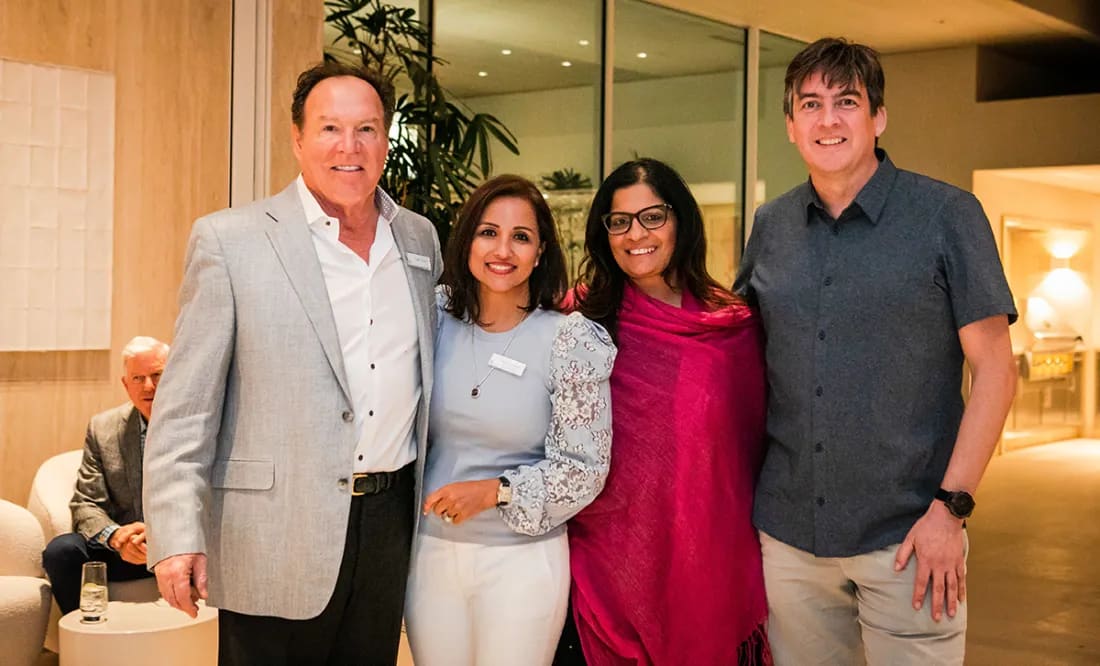
More than 80 BC Cancer Foundation supporters from across B.C. — representing the communities of Surrey, Nanaimo, Kelowna, Vernon, Victoria, Vancouver and the North Shore — gathered for our Palm Desert event in February.
The California weather was unseasonably chilly, but the reception was incredibly warm, and generously hosted in the home of Alberta philanthropist and businessman Roger Gouin. Attendees heard from BC Cancer experts Drs. Brad Nelson, Ross Halperin and François Bénard about how donor support is crucial to fuelling their life-saving work. Now in its fifth year, this annual event is an example of how BC Cancer’s innovations and advances to groundbreaking research go well beyond our B.C. borders to have global impact.
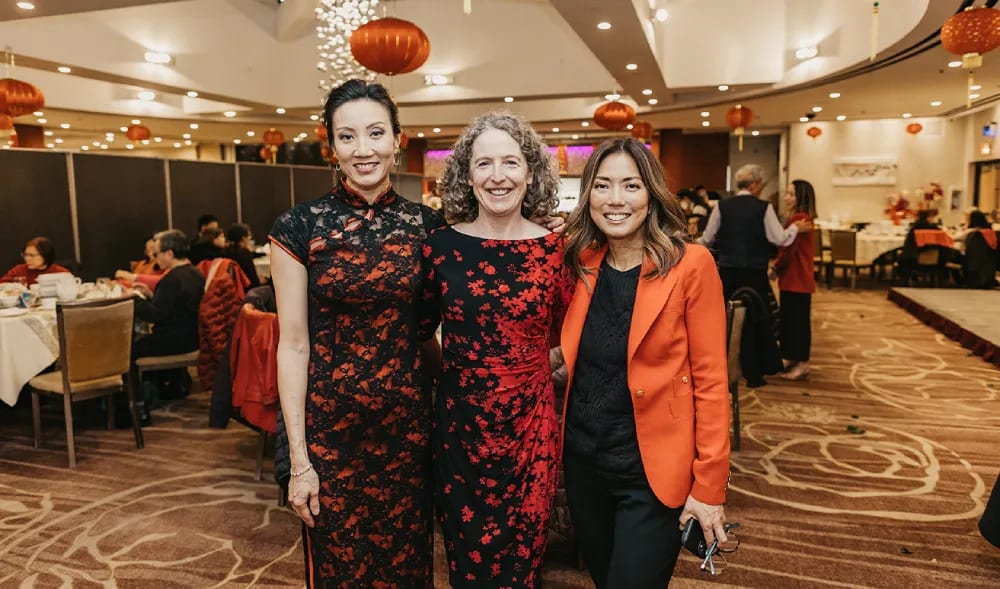
Dedicated donors rang in the Year of the Rabbit with ten delicious courses at Sun Sui Wah Seafood Restaurant in Vancouver, a traditional lion dance to bring good luck and fortune, and a renewed commitment to come together as a community to improve cancer care for all British Columbians.
Highlights of the evening included Global News anchor Sophie Lui who emceed the event, and BC Cancer’s Dr. Stephen Lam shared his team’s cutting-edge work in discovering how environmental air pollution causes lung cancer, particularly in Asian women, a population in which cases have significantly increased over the years. It also included the presentation of this year’s Catalyst Award to concert pianist Libby Yu, for her outstanding contributions to fundraising for testicular cancer research — and sharing her family’s inspiring story to help improve outcomes for others facing cancer.
Find out how you can help us go beyond belief.
In the 25 years since BC Cancer – Kelowna opened its doors, donors from both the Interior and beyond have helped build the centre into a world-class research and care facility.

Donor support has brought life-saving technology to the centre, including a PET/CT scanner that has increased the centre’s capacity to diagnose and stage patients. It has created world-leading research programs, such as Dr. Juanita Crook’s role as Chair in Brachytherapy and Dr. Islam Mohamed’s first-of-its-kind lung cancer clinical trial.
But there is one vital area that is yet to undergo a major upgrade: the Systemic Therapy suite.
Systemic therapy is a large group of treatment types including chemotherapy, immunotherapy, new antibody-drug conjugates, and other targeted agents used to destroy cancer cells. The majority of cancer patients receive a form of Systemic Therapy throughout their journey, and with a growing and aging population, that majority will only increase.
This reality is why the Foundation is fundraising for a new, state-of-the-art Systemic Therapy suite that will increase BC Cancer – Kelowna’s capacity by an incredible 40%, ensuring the Centre will meet the Interior’s needs now and in the future.
Kelowna is the fastest growing metropolitan area in Canada. By 2027, it’s anticipated that one in five new cancer diagnoses in B.C. will come from the Interior. Most of these patients will require Systemic Therapy.
“We’ve essentially maxed out our treatment space for drug therapies,” says Dr. Susan Ellard, department leader for medical oncology at BC Cancer – Kelowna. “The new suite will significantly increase our capacity to deliver treatments and help to provide additional space for the new staff we’re bringing on, as we shift to team-based care.”
Critically, the new suite will also create the infrastructure to bring Phase 1 clinical trials to the Interior – something currently only available in Vancouver.
“Early phase trials usually have a requirement that participants live within a few hours of the treatment centre during the trial,” explains Dr. Ellard. “Trials in Vancouver — that require a long-term stay in the area — are not realistically accessible for patients in the Interior. We have the second busiest clinical trials centre in the province, but don’t currently have the capacity and special equipment to offer Phase 1 trials.”
And the impact of this expansion will be felt provincially. BC Cancer’s increased capacity to deliver early phase clinical trials will accelerate the pace of innovation and access, as their world-class researchers work to develop more effective, precise treatments.
To support BC Cancer – Kelowna’s new Systemic Therapy suite, contact Pardeep Khrod at pardeep.khrod@bccancer.bc.ca
“If you could do something really big, what would you do?” This was a question posed to Dr. Brad Nelson, director of the Deeley Research Centre, by the BC Cancer Foundation in 2014.
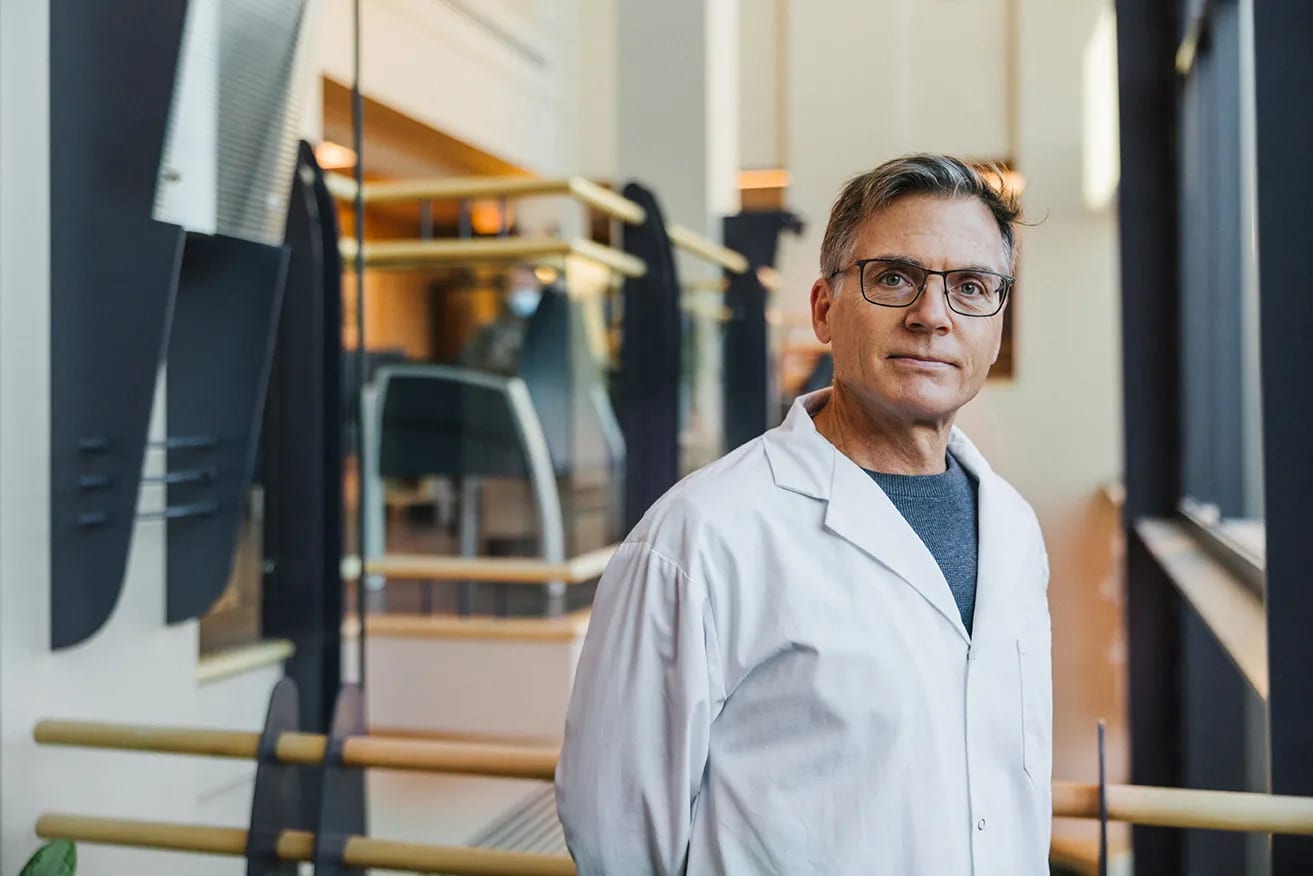
Dr. Brad Nelson, Director of the Deeley Research Centre
Founded 20 years ago with the support of donors, the Deeley Research Centre (DRC) focuses on one of the most innovative and promising fields of cancer research: immunotherapy.
Dr. Nelson responded to the Foundation’s question with the idea of creating a “clean room” — the infrastructure required to produce CAR T-cells. CAR T-cell therapy uses genetically engineered copies of a patient’s own immune cells to attack and destroy cancer cells.
“It’s the first ever gene engineering strategy in oncology. It’s incredibly effective in treating certain blood cancers, and it’s an absolute paradigm shift,” says Dr. Nelson.
Dr. Nelson’s innovative thinking, and funding from the Conconi family via the Foundation, made the DRC the first lab in Canada to produce CAR T-cells. Bringing the production of these cells in-house — rather than ordering from U.S. companies — has also made the treatment more cost-effective, enabling his team to conduct leading-edge clinical trials here in B.C.
With the DRC located in Victoria and the treatments administered in Vancouver (and in Ontario in a cross-Canada partnership with Ottawa Hospital), it’s an impressive reflection of how BC Cancer’s world-class researchers and clinicians collaborate across centres to advance treatments.
“Having the ability to produce CAR T-cells in B.C. allows patients to access cutting-edge, life-extending treatments,” explains Dr. Kevin Hay, the lead clinician on BC Cancer’s CAR-T clinical trials program.
Participants are patients whose cancer isn’t responding to more conventional treatments — and expanding access to these clinical trials provides them new hope.
“CAR T-cell therapy has high rates of complete remission for certain cancers, like acute lymphoblastic leukemia. It can extend the lives of patients — who otherwise may only have months — by years,” says Dr. Hay.
Thanks to donor support, the trials program is flourishing, and the BC Cancer team is already looking at how they can continue that momentum into the next decade so that CAR T-cell therapies are more accessible to everyone in the province.
Even now, Dr. Nelson is exploring how to use CAR T-cells to treat solid tumours. Despite it being remarkably effective in treating blood cancers, researchers globally have yet to find a way to make the treatment work against solid tumours, which represent the majority of cancers.
Specifically, Dr. Nelson’s work is focusing on ovarian and pancreatic cancers — two of the most difficult cancers to treat with existing therapies. A breakthrough here would change outcomes for the thousands of patients diagnosed each year, and their families.
To support Dr. Nelson’s ground-breaking immunotherapy research, please contact William Litchfield at 250.667.8690 or william.litchfield@bccancer.bc.ca
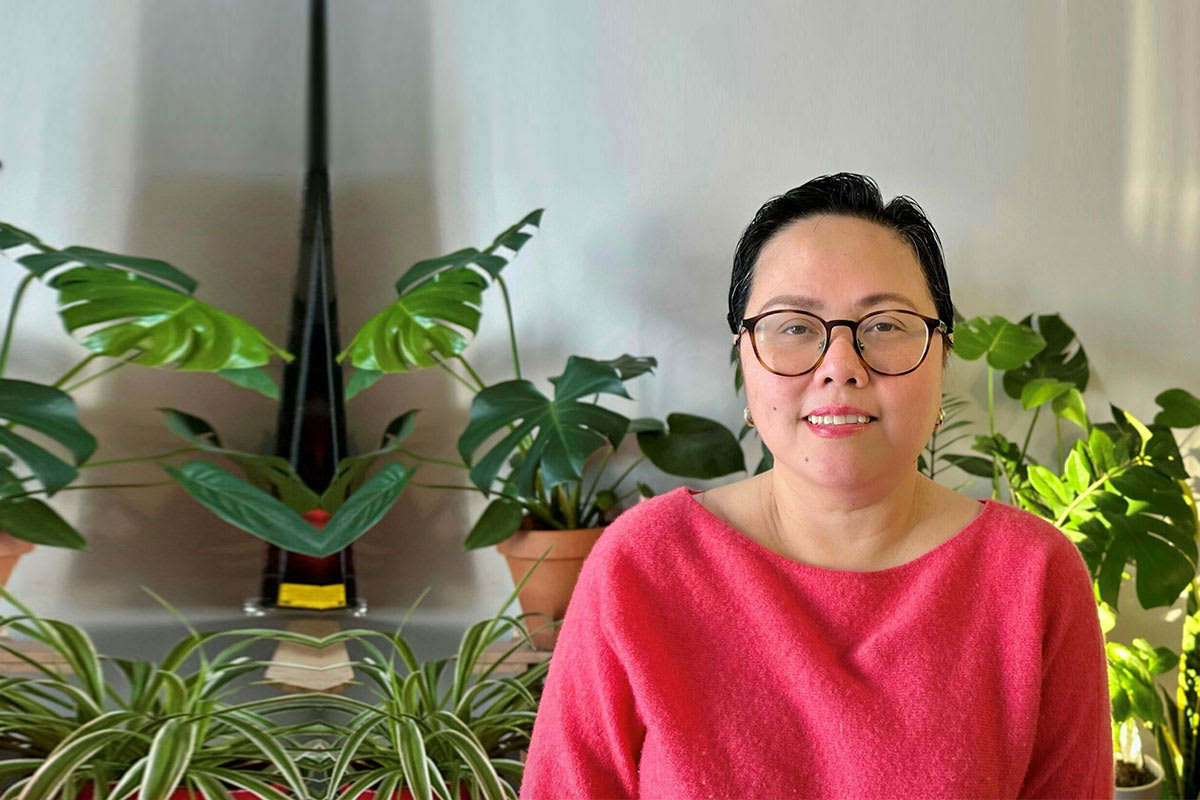
When Jocelyn Degula began planning her family’s move from Dubai to Dawson Creek in 2021, she couldn’t have imagined what her first year in the northeastern B.C. town would look like.
During a routine health exam a month before their move, her doctor discovered a lump that further testing would show to be Stage 1 breast cancer. Her home was packed, her children were about to start school, her husband was starting his courses at the local college — they couldn’t change their plans.
One week before the move, Jocelyn had the tumour surgically removed, but she still needed chemo and radiation treatments to eradicate remaining cancer cells. And so in August 2021, Jocelyn found herself in a new country without a support network and no knowledge of the health care system, trying to figure out how to access the life-saving treatment she needed.
Dawson Creek’s hospital connected her with BC Cancer — Prince George (Centre for the North) and their team jumped into action. Jocelyn learned she would need to spend a month in Prince George — a five-hour drive away from her new home in Dawson Creek — for treatment.
“I needed to bring my children, because they were still small and my husband was studying. They told me not to worry about the accommodation and they [BC Cancer’s Patient & Family Counselling team] arranged an Airbnb for us to stay in during my treatment.”
This was provided through the BC Cancer Foundation’s donor-funded Beyond Barriers Patient Relief Fund. The fund provides patients, who meet program specific criteria, with financial and logistical resources needed to access treatment. This includes patients from rural communities like Jocelyn.
Jocelyn is now cancer free and her family has settled into their life in Dawson Creek.
“We are very thankful. Even though we were new here and we didn’t know anyone, they still treated us as if we were family.”
The Beyond Barriers Patient Relief Fund is made possible thanks to the generosity of our donor community.
To help support patients from rural communities access life-saving care, contact Becky Yost at 604.707.5926 or becky.yost@bccancer.bc.ca
From smudging ceremonies to cancer care spaces and faces that reflect Indigenous people and their culture, BC Cancer’s Indigenous Cultural Safety Project — proudly supported by the BC Cancer Foundation — is breaking down barriers to care to reach vulnerable, at-risk populations.
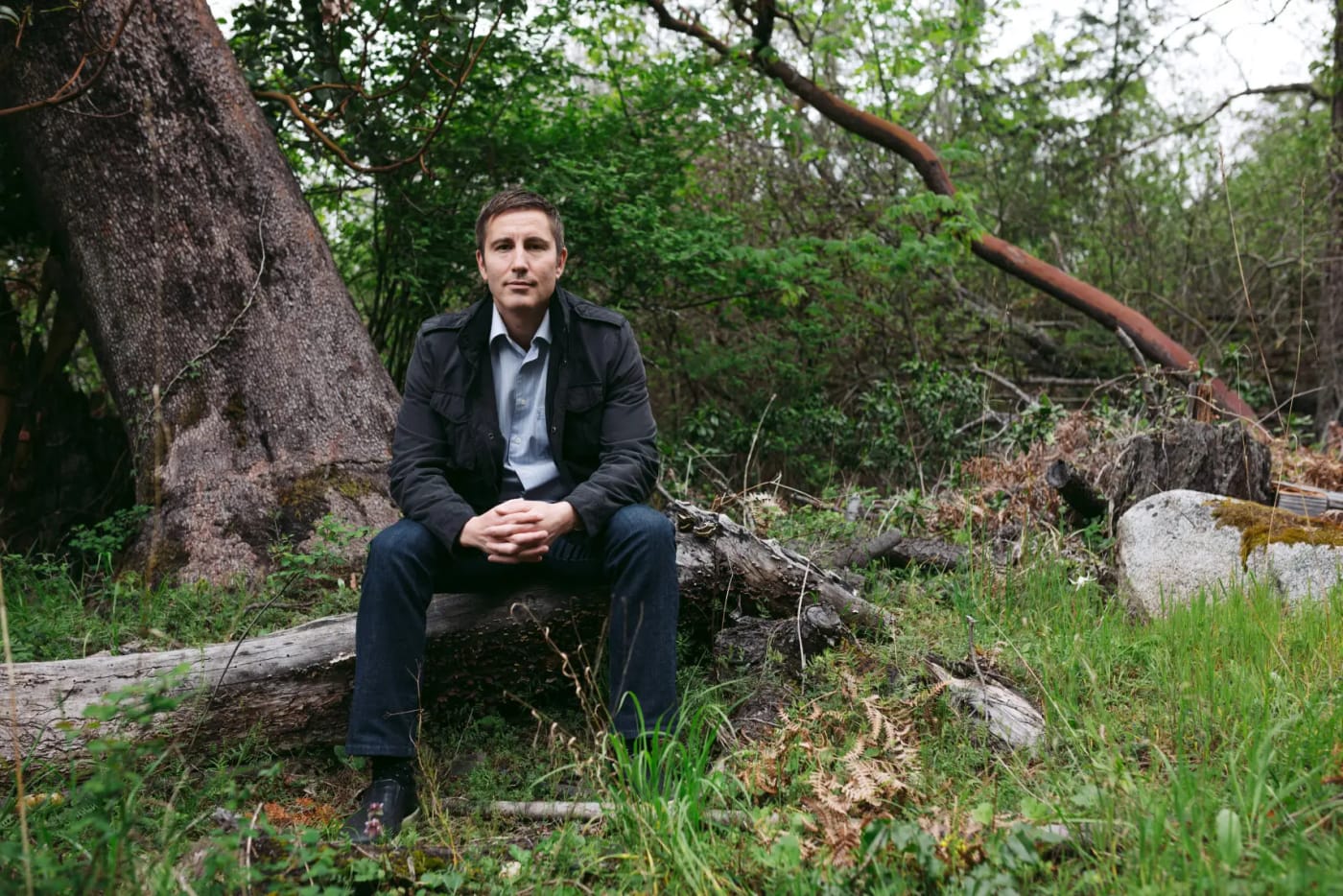
“There’s nothing quite like, as an Indigenous patient, walking into a facility and being greeted by another Indigenous person working as part of your care team. You feel a sense of reduced anxiety and trust because there’s someone like you, who is working for an institution that you may feel some mistrust or hesitancy about,” says Warren Claremont, provincial director of Indigenous Cancer Control at BC Cancer.
And Warren should know — a member of the Gitanmaax Band of the Gitxsan First Nation, he was a patient at BC Cancer just 14 years ago. Much has changed since then, he says, including the implementation of Indigenous Patient Navigators (IPNs) at all six provincial cancer centres.
IPNs support Indigenous patients by creating trauma-informed treatment plans, attending appointments, arranging transportation or accommodation and facilitating access to financial aid such as the Patient Relief Fund. They also provide access to cultural ceremonies, traditional medicines, spiritual care and elder support — all of which are an important part of culturally safe care.
BC Cancer data shows Indigenous patients, specifically First Nations, are less likely to survive a cancer diagnosis, and experience higher incidences of cervical and colorectal cancer compared to non-First Nations — likely due to late-stage diagnoses resulting from a lack of access to regular screening, or a hesitancy to seek medical help for fear of racism and discrimination.
“Having another Indigenous person help you navigate the system is game-changing,” says Crystal Harper, an IPN at BC Cancer – Vancouver who watched her dad, a member of the Lil’wat First Nation, struggle to access cancer care before he passed away from liver cancer.
Monica Gerow, an IPN at BC Cancer – Kelowna agrees: “I see the relief on people’s faces when they’re offered a referral to an Indigenous person, when I hold space for them culturally — it means finally being able to breathe in those spaces, and allows them to just focus on their cancer journey.”
To support the work of IPNs or the Indigenous Cultural Safety Project at BC Cancer, contact Lindsay Abbott at lindsay.abbott@bccancer.bc.ca or 604.839.3626
Jackie Ellis reflects on leaving a legacy gift.
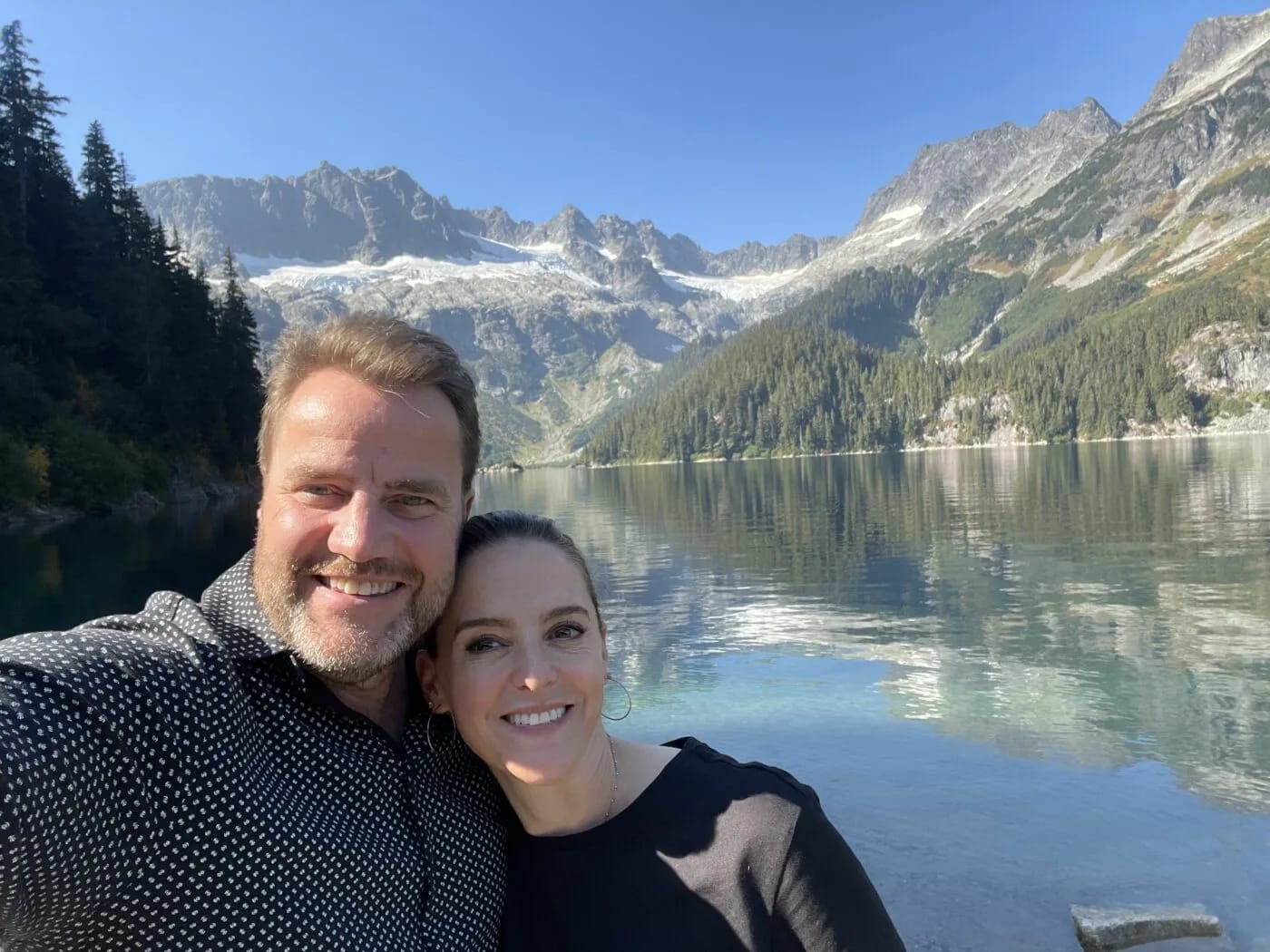
It’s not easy to think about, or plan for our future passing, but I made a promise to myself to make a difference. By including the BC Cancer Foundation in my will, I know that my promise will be my legacy.
In August 2010, at age 38, I experienced shortness of breath, tightness in my chest and excessive fatigue. I had searched my symptoms on the internet and felt confident in my self-diagnosis of ‘walking pneumonia.’ Therefore, when I heard, “You have lymphoma,” I was shocked and in disbelief. My first words were, “What I have cancer, I’m going to die?”
I truly don’t remember having the time to comprehend the severity of my situation, because I was immediately supported and cared for by professionals in our B.C. medical system. Starting the next day, a Friday, I met with a respirologist, a thoracic surgeon, and I had a full body CT scan. Saturday, I had surgery to biopsy the tumours in my chest. Sunday, I was moved to BC Cancer. Monday, I had a bone biopsy. And on Tuesday and Wednesday I started my first rounds of CHOP-R chemotherapy at BC Cancer.
In the past 13 years I have had cancer twice. Last year, I was diagnosed with melanoma. Again, within days of my diagnosis, I saw a surgical oncologist to create a treatment plan, a PET/CT scan, and finally surgery to remove the tumour. No chemo, no radiation, and peace of mind that the margins and scans were clean.
During my cancer journeys, I witnessed the power of research. Only two years prior to my lymphoma diagnosis, the chemotherapy protocol changed to improve prognosis. I was able to be part of a clinical trial in which I had a PET scan to assess the success of my treatment. If my chemotherapy was not working, I had the option to try a new drug protocol that was being researched.
My life changed over an August long weekend and my clarity became hyper focused on health. Nothing mattered more than living. The shock of facing my mortality made me realize that I was not prepared. Like many people, I created deals with myself and the universe in hopes of survival.
As I negotiated, I came to realize that my main goal was to give back. I wanted to be kinder to myself, to give others the love and support I felt while managing cancer, to advocate for supporting research, and to enhance the lives of future generations.
Everyone views life events through their personal lens of importance. For me, having experienced the fragility of my life too early, I reflect daily on my relationships with my family, friends or people I meet in a moment. My personal hope is that I will be remembered as kind, thoughtful, inspiring, aware, loving, honest, loyal and generous.
My cancer experiences have made me think about and prepare for my future. I have a will because I want to be at ease in my life now. I’ve included the BC Cancer Foundation in my will because I want to know that when I pass, my goal to love and advocate for those who may one day hear “You have cancer” will continue.
Cancer research is expensive. I have seen firsthand the incredible impact of funds raised by the BC Cancer Foundation to support clinicians, researchers, technologies and supportive care for all residents in our province. When we get involved and go beyond belief in ourselves, we feel the energy of creating change.
I want to be part of that change. That’s why I have been a rider in the Tour de Cure since 2012 and am a patient advocate focused on heightening awareness of the world-leading cancer care we have here in B.C.
And it’s why I’m leaving a gift to the BC Cancer Foundation in my will.
To learn more about leaving a gift through your estate to the BC Cancer Foundation please reach out. We’re happy to work with you and your financial and legal advisors: 1.888.906.2873 or legacy@bccancer.bc.ca